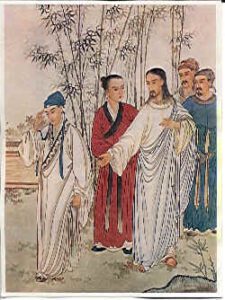
In the Gospel of Mark, a man asked Jesus: “Good teacher, what must I do to inherit eternal life?” Jesus said to him: “You know the commandments: You shall not kill; you shall not commit adultery; you shall not steal; you shall not bear false witness; you shall not defraud; honor your father and your mother.” The man replied: “Teacher, all of these I have observed from my youth.” Jesus, looking at him, loved him and said to him, “You are lacking in one thing. Go, sell what you have, and give to the poor and you will have treasure in heaven; then come, follow me.” At that statement his face fell, and he went away sad, for he had many possessions. Jesus looked around and said to his disciples, “How hard it is for those who have wealth to enter the kingdom of God!” The disciples were amazed at his words. So Jesus again said to them in reply, “Children, how hard it is to enter the kingdom of God! It is easier for a camel to pass through the eye of a needle than for one who is rich to enter the kingdom of God.” (cf. Mark 10:17-25)
The Gospel of Matthew records a similar account (cf. Matthew 19:16-21), as well as the Gospel of Luke (cf. Luke 18:18-25). Yet another version comes from an early Christian writing known as the Gospel of the Nazoreans, which was composed between 100-160 A.D. The account is as follows:
The other of the rich men said to him (Jesus): “Master, what good thing shall I do and live?” He (Jesus) said to him: “Man, perform the law and the prophets.” He answered him: “I have performed them.” He (Jesus) said to him: “Go, sell all that thou hast and divide it to the poor, and come, follow me.” But the rich man began to scratch his head, and it pleased him not. And the Lord said to him: “How can you say ‘I have performed the law and the prophets?’ seeing that it is written in the law ‘Thou shalt love thy neighbor as thyself,’ and look, many of your brothers, sons of Abraham, are clad with dung, dying for hunger, and your house is full of much goods, and there goes out therefrom nothing at all unto them.” And he (Jesus) turned and said to Simon his disciple, sitting by him, “Simon, it is easier for a camel to enter through the eye of a needle than a rich man into the kingdom of the heavens.”
The Gospel of the Nazoreans explains the context for us and it brings out an important point: although the rich man had observed most of the commandments, there was still one commandment that he lacked; he lacked in his love for neighbor, particularly in sharing his wealth with those who are destitute. Jesus confirmed this when He said to the rich man: “You are lacking in one thing. Go, sell what you have, and give to the poor and you will have treasure in heaven; then come, follow me.” (cf. Matthew 19:21, Mark 10:21, Luke 18:22). But the rich man was so attached to his possessions that he couldn’t give them away to the poor, so he went away sad.
How important it is, for those who are able, to give to the poor! There are over a hundred scripture passages about giving to the poor. In the parable of the Rich Man and Lazarus (Luke 16:19-31), the rich man obviously has not given enough, or even anything at all, to the poor man Lazarus. Likewise, in the parable of the Rich Fool (Luke 12:16-21), the rich man kept building more and more barns to store all of his increasing wealth. It is not enough for us to be mentally detached from our possessions; we have to actually give to the poor. If we think or say that we are detached from our money and possessions, but it is stored up someplace so that we can have a feeling of financial security, what spiritual benefit will that give us?
The Church defines almsgiving as money or goods given to the poor as an act of penance or charity; it is also a work of justice that is pleasing to God (CCC 1434, 1969, 2447). By giving to the poor, a Christian stores up treasure in heaven. One way to look at why that is, is because the poor cannot repay us, therefore God repays us in heaven. The Book of Proverbs tell us that indeed is the case: “Whoever cares for the poor lends to the LORD, who will pay back the sum in full (Proverbs 19:17).”
St. Paul gives great advice on the right use of wealth. In the First Letter to Timothy, he said: “Tell the rich in the present age not to be proud and not to rely on so uncertain a thing as wealth but rather on God, who richly provides us with all things for our enjoyment. Tell them to do good, to be rich in good works, to be generous, ready to share, thus accumulating as treasure a good foundation for the future, so as to win the life that is true life (1Timothy 6:17-19).” Without a doubt, most Christians are at present giving, or have given in the past, to the poor; but the question is: Is it enough? Only our conscience can answer that!